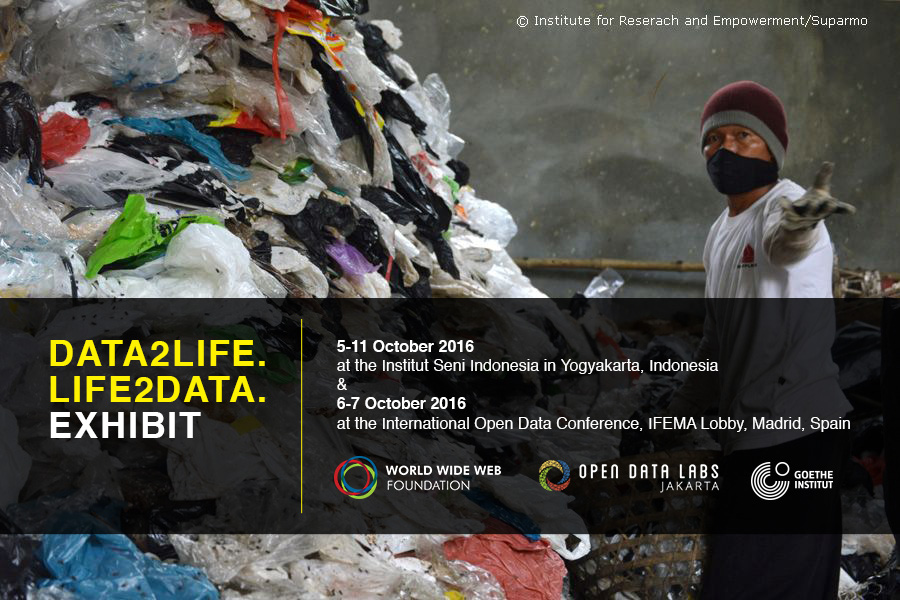
October 5 and 6 exhibit openings will showcase the photography and creative narrative results capturing data as reality in Yogyakarta
We will be unveiling our “Data2Life. Life2Data” exhibit to a global audience this month. The exhibit will open on 5th October in Yogyakarta, Indonesia at the Institute of Art. The exhibit will also be shown from 6th October in Madrid, Spain at the International Open Data Conference, attended by international organisations, government leaders, researchers and journalists.
The “Data2Life. Life2Data.” exhibit is part of a joint project of the World Wide Web Foundation’s Open Data Lab Jakarta and Goethe-Institut Indonesien. The project has two components: in “Data2Life.”, we showed the process of how people produce, use and consume data. In “Life2Data.”, we created a visual record of how data is represented in our day-to-day lives. The local exhibit will display 78 photographs, covering eight locations and themes that tackle realities faced by Yogyakarta citizens, including school infrastructures, canal development, waste management, clean water access, and more. To get truly unique and authentic perspectives, we trained nine community-based organisations on the basics of visual ethnography, photography, and data analysis. Although not all sources used here are open data, we found that for open data to lead to real change, citizens must first understand how data affects their day-to-day lives.
Sharing her thoughts on the project and the connection of open data to culture, Christel Mahnke, Regional Head of Information & Library Department in Southeast Asia/Australia/New Zealand of the Goethe-Institut Indonesien, said:
“Data is a commodity, produced by everybody, every day. It is part of our economy, society and therefore part of our culture. The global availability and easy use of data has changed the way we listen to music, look at pictures and share stories. The medium of documentary photography seems especially suitable to capture the meaning of open data—a way of visual storytelling. The impact of data to everyday life – which influences culture – is visualised, as well as the process of understanding and using open data.”
Adding to this, she also expressed her excitement about the project and its activities:
“The basics of photography, visual ethnography and the use of open data were taught in a series of workshops in Yogyakarta. This exhibition is the project’s culmination: it shows the results of the activities, and reflects the process of appropriation of data. We’re excited to show it to everyone.”
From the side of the Open Data Lab Jakarta, Adhitya Randy, Data Scientist and also project manager for the Data2Life. Life2Data. project, talked about his experience:
“This wasn’t an easy project to embark on—data is a complex concept, and capturing it so everyone can have an understanding of it posed a big challenge; but we’re not ones to back down on a challenge. We worked hard with Perkumpulan IDEA and PannaFoto to organise the workshops, and trained eager community-based organisations. It has been inspiring to see how the organisations took the skills they learned to create incredible visual stories of data affecting the daily lives of people in Yogyakarta. These are stories everyone can all relate to.”
You could catch the “Data2Life. Life2Data” exhibit:
From the 5th of October, starting at 13:00, to the 11th of October
at the Institute of Art (Institut Seni Indonesia) in Yogyakarta, Indonesia
From the 6th to 7th of October
at the International Open Data Conference,
IFEMA Exhibition Center Lobby (Institución Ferial de Madrid Lobby) in Madrid, Spain
For more information about Goethe-Institut Indonesien and their activities, visit www.goethe.de/indonesia or contact Wilton Djaya at wilton.djaya@jakarta.goethe.org. For any inquiries about the exhibit, the “Data2Life. Life2Data.” project or the Open Data Lab Jakarta and its projects, visit www.labs.webfoundation.org or contact Adhitya Randy at adhitya@webfoundation.org. Stay updated on the event by following @ODLabJkt and @GI_Indonesien on Twitter.
Leave a Reply